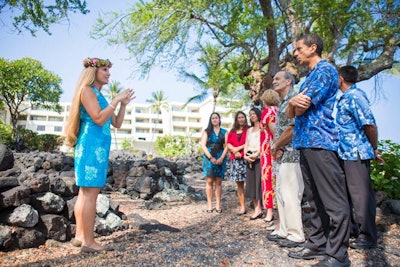
Meeting groups convene for the fundamental purpose of advancing an organization’s goals—but planners are realizing more and more that those objectives aren’t strictly about the bottom line. In the post-recession age, where budgets are heavily scrutinized and there are concerns about events being wasteful, organizers—and attendees alike—are demanding programs include ways for delegates to make cultural, environmental, charitable, or other significant impacts.
The trend grows out of the emphasis on corporate social responsibility, or C.S.R., which industry pros say has recently exploded in importance.
“In addition to giving back to those in need and building a healthy company culture, C.S.R. programs unquestionably create a positive public relations opportunity,” says Chris Lee, C.E.O. of destination management company Access Destination Services. “The social and political climate surrounding the industry during the financial crisis was responsible for the cancellation of thousands of meetings around the world, and the A.I.G. effect left companies hesitant to travel for meetings for fear of ridicule in the media. It was during that time that many destination management companies and other meeting vendors reworked their offerings to adapt to the changing climate.”
Lee says that while C.S.R. programs were once incorporated in the form of one-off gestures, now they’ve expanded to become part of a more systemic and holistic approach to meetings.
The shift also comes as companies realize that deep employee engagement is not separate from the bottom line—it’s inextricably linked to it.
Christopher Hill of Hands Up Incentives, which plans incentive trips, destination meetings, retreats, and teambuilding programs, says that companies are reaping the results of increased productivity thanks to meaningful teambuilding efforts. They’re seeing higher levels of employee engagement “that results from having staff excited to work for a company that shares the same values that they do,” he says.
Beyond that, Hill says “companies may be seeking to build goodwill in a given destination for strategic, market-entry reasons,” and a meeting with a carefully crafted charitable or community-minded component can directly assist those efforts.
Overall, “[Adding an element of social responsibility is] a cost-effective way to have a meeting and also build stronger teams, get more engaged, build goodwill, and enhance C.S.R. reputation in one complete package,” Hill says.
To help engender this goodwill, meeting groups frequently try to address an environmental issue or help a charitable organization within the community.
Access Destination Services offers comprehensive multiday programs that have included rebuilding an entire computer lab destroyed by Hurricane Katrina and providing teddy bears to hospitalized children.
Venues around the world are on board to address the trend, as well, and are stepping up their offerings to meet these requests. Fairmont Mayakoba in Playa del Carmen, Mexico, for instance, gives groups the option to assist at a local park, paint a public school, or volunteer at an orphanage.
When it comes to such meeting activities, interactivity is the name of the game; planners say group participation is essential for substantial teambuilding results.
To encourage this, groups are fitting in projects not just at break time, but also throughout their events. For instance, the “Clean the World” station at IMEX was on the show floor and proved a huge success: Delegates could stop by and help compile hygiene kits at a booth sponsored by Meet Green as their individual schedules permitted.
As for destination meetings, groups are looking to connect with local communities in a meaningful way. The Fairmont Mayakoba offers a meeting break or dinner of traditional Mayan cuisine paired with teambuilding activities closely related to the Mayan community, including exploring the locally operated Sian Ka’an Biosphere Reserve or bike building for a local orphanage.
On the Big Island of Hawaii, the Sheraton Kona Resort & Spa has a dedicated cultural ambassador on staff, addressing the needs of meeting groups who want to experience more than just the landscape.
“Attendees receive a true sense of place and experience the Hawaiian culture in a way that is real and tangible, leaving with an overall sense of connection,” says Sheraton Kona’s director of culture and leisure activities, Lily Dudoit.
For meeting groups looking for a cultural tie-in, the venue can arrange for attendees to assist in the removal of invasive plants around historic sites or connect them with the local children’s nonprofit Nakoa Foundation.
Meeting pros say that the move toward meaningful meetings comes from an authentic industry-wide interest in social responsibility as well as from the bottom-line benefits. For those reasons, it’s a trend unlikely to wane.
“I’m happy to say that C.S.R. is here to stay,” says Access Destination Services creative director Erik Berg. “A significant percentage of the events we produce for our clients include some kind of C.S.R. programming. It’s without a doubt a win-win scenario, and I’m confident more and more companies will pick up on the trend.”



















